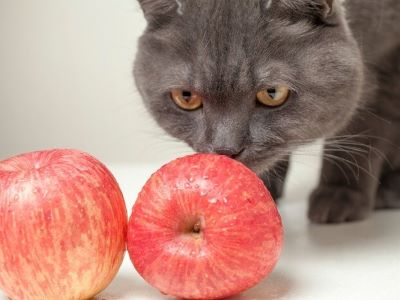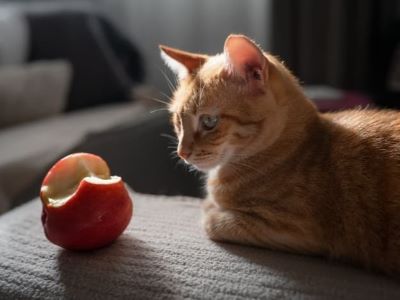One of the most well-liked and generally accessible fruits in the world is the apple. They are delectable, wholesome, and adaptable. They are delicious when eaten raw, cooked, roasted, juiced, or dried.
What about your feline companion, though? Do cats also eat apples? Do they benefit them or harm them? How ought you to get them ready for your cat?
All of these queries and more will be addressed in this post. We’ll go through the advantages and drawbacks of giving apples to cats, the best ways to do so, and the symptoms of apple toxicity in cats. Continue reading to learn everything there is to know about cats and apples.
Can Cats Eat Apples?
The short answer is yes, cats can eat apples. However, there are several things to consider before you make it a regular treat.

First of all, because they are obligate carnivores, cats require animal protein in order to live a healthy life. Instead of plant stuff, they have evolved to digest meat.
As a result, their digestive systems are not built to process vast quantities of fruits or vegetables. As a result, apples should not be a regular part of your cat’s diet but rather a treat.
Second, not every component of an apple is suitable for cats. As long as the apple has been washed and peeled, the apple flesh is normally safe for cats to consume.
Apples’ flesh is packed with nutrients that are good for your cat’s health, including vitamins, minerals, antioxidants, and fiber.
Apple seeds, stems, and leaves are poisonous to cats because they contain cyanide. The neurological system, heart, and blood cells of your cat could be seriously harmed by the chemical cyanide. For cats, even a small amount of cyanide can be lethal.

Thirdly, not all felines enjoy eating apples. In terms of food, cats have a variety of tastes and inclinations. While some cats could adore the apples’ crunchy texture and sweet flavor, others might find them to be unappetizing or bland.
Considering that cats are unable to detect sweetness, they might not find apples to be as appealing as people do. Therefore, if your cat doesn’t want to eat apples, you shouldn’t force them to.
How to Feed Apples to Your Cat
If you decide to feed apples to your cat, you should follow some simple guidelines to ensure their safety and enjoyment.

- Thoroughly clean and peel the apple. This will get rid of anything that could damage your cat, like dirt, insecticides, or wax.
- Slice or cut the apple into small pieces. Your cat will be able to eat and swallow the apple without choking or gagging if you do this.
- Take the apple’s stem, leaves, and seeds off. These components, which contain cyanide, could be fatal to your cat.
- Offer just a little of the apple at a time. Your cat will be content with a few pieces or slices as a treat. Your cat may experience diarrhea or upset stomach after eating too much apple.
- Observe how your cat responds to the fruit. Apples and other fruits may cause allergies or intolerance in some cats.
- After giving your cat apples, stop right away and call your vet if you detect any signs of pain or discomfort, including vomiting, drooling, itching, swelling, or trouble breathing.
Benefits of Apples for Cats
Apples are not essential for your cat’s nutrition[1], but they can provide some health benefits if fed in moderation. Here are some of the benefits of apples for cats:

- Vitamin C, an antioxidant that can help strengthen your cat’s immune system and shield it from illnesses, is abundant in apples.
- A cat’s vision, skin, and blood coagulation depend on vitamins A and K, both of which are abundant in apples.
- The minerals calcium and phosphorus, which are crucial for the bone and dental health of your cat, are found in apples.
- Apples contain a lot of water, which can help your cat stay hydrated and ward off urinary tract infections.
- Dietary fiber, which is abundant in apples, can assist in regulating your cat’s digestion and avert constipation and diarrhea.
Risks of Apples for Cats
If given correctly and sparingly, apples are generally safe for cats. You should be aware that giving apples to cats carries some risks, though. Here are a few dangers associated with apples for cats:

- Sugar, which might be bad for your cat’s teeth and weight, is included in apples. In your cat, eating too much sugar might lead to obesity[2] or dental problems.
- Apples include carbohydrates as well, which can cause your cat’s blood sugar to increase and lead to diabetes or other metabolic diseases.
- Apples don’t meet your cat’s nutritional needs because they have a low protein level. If you give your cat too many apples, they may not get the taurine and other critical amino acids they require from animal sources.
- Some cats may develop food allergies or intolerances after eating apples. After eating apples or other fruits, some cats that are sensitive to them may have symptoms including vomiting, diarrhea, itching, or swelling.
- If apples contain cyanide, cats may be poisoned by them. Apple seeds, stems, and leaves all contain cyanide, which can kill or severely harm your cat.
FAQs
Can cats eat apple skin?
Cats can eat apple skin, as long as it is washed and free of pesticides or wax. Apple skin contains phytonutrients that can benefit your cat’s health. However, some cats may find the skin too tough or bitter to eat, so you may want to peel the apple before offering it to your cat.
Can cats eat apple seeds?
Cats can’t eat apple seeds, sorry. The dangerous element cyanide found in apple seeds can seriously affect your cat’s neurological system, heart, and blood cells. For cats, even a small amount of cyanide can be lethal. Apples should never have their seeds left in before being given to your cat.
Can cats eat applesauce?
As long as it is plain and unseasoned, cats may eat applesauce. Cats may find it simpler to ingest and digest applesauce than raw apples. Applesauce still has sugar and carbohydrates that can be harmful to your cat’s health, so you should keep the amount you give your cat to a minimum. Additionally, stay away from applesauce that has additives, preservatives, or artificial sweeteners that could hurt your cat.
Can cats eat green apples?
As long as they are ripe and fresh, cats can eat green apples. Red and green apples both offer similar nutritional contents and advantages for cats, while green apples are typically more acidic. To find out what your cat enjoys, check out various apple varieties as some cats might not enjoy the taste of green apples.
Conclusion
Apples are not a compulsory component of your cat’s diet, but if given infrequently and carefully, they can be a delightful and healthful treat for your cat. Apples can give your cat some vitamins, minerals, antioxidants, and fiber, but they can also lead to issues if eaten inappropriately or in excess amounts.
Before giving an apple to your cat, you should always wash, peel, and cut it, making sure to keep the apple’s stem, leaves, and seeds out of it. Additionally, keep an eye on your cat’s response to the apple and speak with your veterinarian if you have any worries.
References:
- Nutrition – General Feeding Guidelines for Cats | VCA Animal Hospitals. (n.d.). VCA HOSPITALS.
- Obesity in cats | VCA Animal Hospital | VCA Animal Hospitals. (n.d.).

Brenda Castillo is a volunteer groomer of a local pet welfare group in New York and a regular contributor to CatLikesBest. She likes to read & write about cat grooming. She also guardians two chubby tabbies, Belly & Puma.

